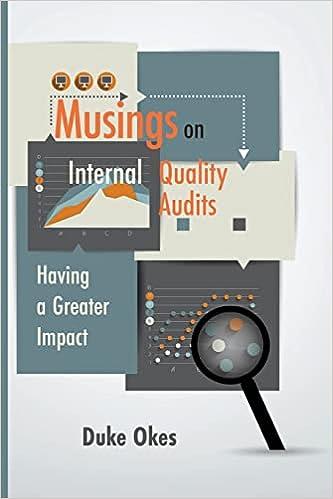Question
In the new international context, the auditor's mission complicates every day. He can no longer perform audit missions in which he only expresses his view
In the new international context, the auditor's mission complicates every day. He can no longer perform audit missions in which he only expresses his view on whether the financial statements are true. The auditor must be something more, He must oscillate between reinforcing the belief of the stakeholders that the financial statements give a true picture of the financial position and providing them with information about the health status of the entity.
The keywords of the success of the audit mission will consider the consolidation of the credibility of accounting information, along with the early detection of some possible risks which the entity may expose to in the future. This context is not simple in which the auditors' work means exposing the opinion and alerting the risks to which the entity is exposed every day, especially in new international conjuncture.
Thus, the current economic crisis emphasizes the importance of one of the main accounting principles, The going concern assumption. Increasingly more organizations, due to the seriousness of this crisis, and speed of development, confront difficulties in forecasting and cannot say with a reasonable risk level that presently the conditions of fulfillment of their activities take place normally. While the potential impact on the result and the amount of sources and resources is considerable, the liquidation value is obviously lower than the normal value of using an asset.
Currently, the pressure on the auditor is becoming greater, partly the cause of the pressure is the so-called Audit expectation gap where the public expects so much more from the auditor than they can actually be permitted by the standards and statutes to do. However certain standards such as ISA 315, require the auditor to submit claims by expressing an opinion on the existence or absence of a significant risk. Further, the ISA 570, explains the auditors responsibility to obtain sufficient appropriate audit evidence about the appropriateness of the management use of the going concern assumption in the preparation of the financial statements and to conclude whether there is material uncertainty about the entity's ability to continue as a going concern.
In Kenya particularly, most of the reputable firms have finally been liquidated and a number of them are under financial distress. This has posed a lot of mistrust in the auditors opinion in that even under serious circumstances, modified opinions have been issued which almost give a clean bill of health as unqualified opinions would do. Thus the public perceives the existence of information asymmetry in audit reports.
Required
- Discuss the reasons that may affect the auditors ability to gather information on the going concern of an entity (10 marks)
- Discuss the factors that the auditors would check when assessing the going concern on an entity (10 marks)
- Using relevant examples, discuss the three elements of the expectation gap ( 10 mark)
- Discuss ways in which the expectation gap may be reduced. (10 marks)
Step by Step Solution
There are 3 Steps involved in it
Step: 1

Get Instant Access to Expert-Tailored Solutions
See step-by-step solutions with expert insights and AI powered tools for academic success
Step: 2

Step: 3

Ace Your Homework with AI
Get the answers you need in no time with our AI-driven, step-by-step assistance
Get Started


